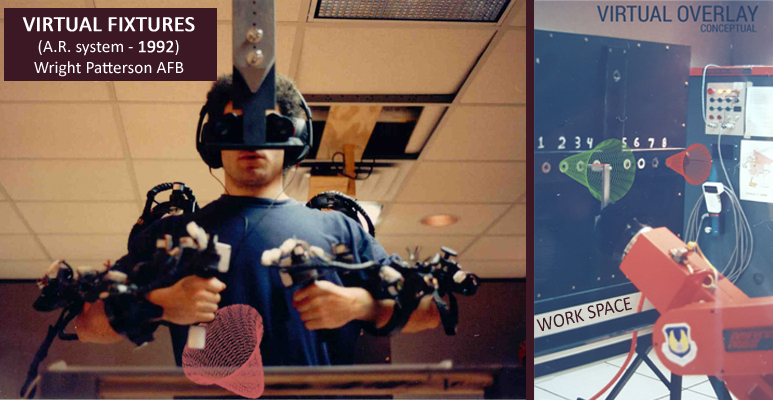History of video games/AR
Prototype Technology of the 1980's and 1990's
[edit | edit source]During the Cold War there was a massive amount of Research and Development ongoing by both government and commercial agencies, which had a side effect of trickling down to consumers later, namely in Augmented Reality, and general advances in computing. During this time, a number of marketing attempts to promote the technology would be made.[1] Though this technology would not see consumer use in the 1980's and 1990's, it would form the basis for common gaming technologies decades later.
HUD development greatly influenced AR development
-
Virtual-Fixtures in 1992, the first immersive augmented reality system.
-
Augmented reality in 1999, being used on a Helicopter.
Augmented Reality is fielded
[edit | edit source]The mid 2010's saw large corporations begin to push into the field with their own entries in Augmented Reality.[2][3] Google Glass and Microsoft Hololens help popularize the idea augmented reality devices in the public, though neither device sees widespread consumer use.[4]
-
A man using HoloLens.
-
Google Glass
-
Fiducial Markers, a common tool used by AR systems when markerless tracking is not possible due to technology constraints.
-
10,000 Moving Cities, a multiplayer Augmented Reality game.
References
[edit | edit source]- ↑ "The Wacky World of VR in the 80s and 90s". PCMAG. Retrieved 25 November 2020.
- ↑ Manjoo, Farhad (22 January 2015). "Microsoft HoloLens: A Sensational Vision of the PC's Future (Published 2015)". The New York Times. Retrieved 28 November 2020.
- ↑ Miller, Claire Cain (8 April 2014). "At Google, Bid to Put Its Glasses to Work (Published 2014)". The New York Times. Retrieved 28 November 2020.
- ↑ "Google Glass, HoloLens, and the Real Future of Augmented Reality" (in en). IEEE Spectrum: Technology, Engineering, and Science News. https://spectrum.ieee.org/consumer-electronics/audiovideo/google-glass-hololens-and-the-real-future-of-augmented-reality.


